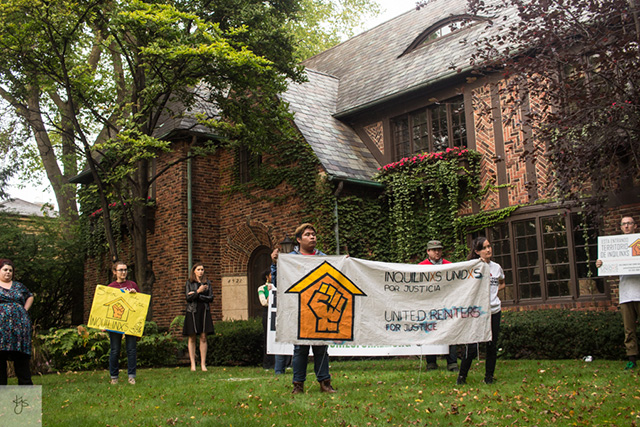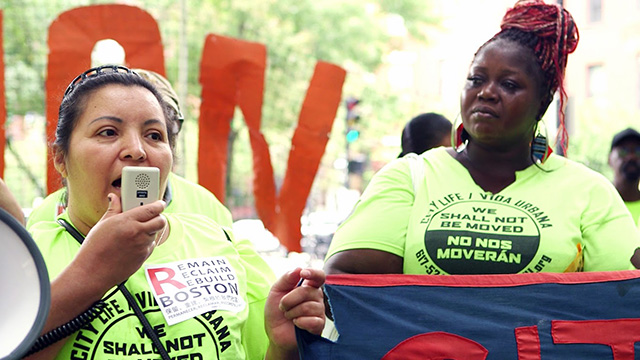
Truthout is an indispensable resource for activists, movement leaders and workers everywhere. Please make this work possible with a quick donation.
In her five years renting from notorious Minneapolis slumlord Stephen Frenz and his Apartment Shop LLC, Molly Hasbrook, who is the building captain for her apartment unit, has seen it all.
“Lots of ignored maintenance issues, some very major, cockroaches for about three years that weren’t properly handled … and leaks,” she told Truthout.
It gets worse.
“One year in January we didn’t have any heat. They would come and they would quote-unquote ‘fix it’ during the day, and by nightfall it would be completely gone and out,” Hasbrook said, describing how she and her neighbors were left exposed to the biting cold of a Minnesota winter. “For that month, I still got a bill that was over $100 for utility costs,” she said.
All this, coupled with Frenz’s steady rent hikes over the years, led Hasbrook and other tenant-organizers to hold a protest and vigil on the front lawn of the slumlord’s mansion this week to remind him of the substandard conditions she and the tenants of his 1,200 other units endure. “He did not come out. However, the sprinklers were turned on,” Hasbrook said. “But we just covered the sprinklers with bandanas and kept right on going.”
The vigil was just one of several actions popping off this week in the Minneapolis/St. Paul area — and across the nation. Renters in 45 cities are organizing protests from September 16 through September 24, during a nationwide “National Renter Week of Action and Assemblies” spearheaded by the Right to the City Alliance to fight back against the Trump administration’s threat to cut billions from the Department of Housing and Urban Development (HUD), and to demand rent control and just-cause eviction policies.
Creative direct actions, including protests at the residences of corporate landlords and HUD offices, banner drops, and targeted actions at candidate forums and zoning hearings, have been unfolding across the country to draw attention to an ongoing crisis of displacement constituting a renters state of emergency disproportionately impacting neighborhoods of color.
Renters Resist HUD Cuts, Privatization
Shatia Strother, program coordinator with Families United for Racial and Economic Equality, worked to coordinate a march to the office of the New York City Housing Authority (NYCHA) this week to call for full funding for HUD and push back against programs opening up public housing to privatization.
President Trump’s 2018 budget, with the support of HUD Secretary Ben Carson, proposes cutting $6 billion from HUD’s $46 billion budget — a cut that would slash the agency’s funding by 14 percent. In the face of these cuts, NYCHA is turning to a controversial program aiming to sell off the authority’s land to private developers to soften its multibillion deficits.
“Whoever holds the purse strings actually holds the power.”
“A lot of resident protection programs, a lot of the policies and guidelines that HUD provides to local housing authorities in different states, those things are at risk through the budget cuts, because whoever holds the purse strings actually holds the power,” Strother tells Truthout. “The federal government has been constantly failing our communities for decades, and you can see a pattern and a trajectory of decreased funding over time. So these more recent proposals are really just a continuation of that, but they are a lot deeper in terms of the amount that’s being cut, and they also have taken on this insidious nature when you look at the current administration.”
Strother, who is part of the national planning team for the Renter Week of Action this week, told Truthout it’s is the second annual call to action for renters, public housing residents, homeless families and homeowners whose mortgages are “underwater” (or higher than the market value of the property) to demand affordable housing since the campaign’s first day of action last September.
Nationally, rents are rising coast to coast as incomes and real wages continue to stagnate. Angel Ross with the Oakland-based research organization PolicyLink told The Progressive that the national median rent has “increased by 9 percent from 2000 to 2015 while median renter household incomes declined by 11 percent in real, inflation-adjusted terms.”
This combination of rising rents and declining incomes is even more pronounced in rapidly gentrifying housing markets like those in California’s Bay Area. “In Oakland, for example,” Ross said, “median rent increased by 16 percent while median renter household income declined by 11 percent. Unsurprisingly, the share of renters paying more than 30 percent of income on rent has grown since 2000.”
Renters Reveal Landlords’ Malfeasance
Back in Minneapolis, Hasbrook’s organization, Inquilinxs Unidxs Por Justicia (United Renters for Justice), has been working to call attention to the systemic nature of Frenz’s and other landlords’ predatory rent hikes and failures to maintain their buildings. Last year, the Star Tribune found that Frenz had “accumulated more housing violations than any other landlord of large apartment buildings in Minneapolis over the past three years,” according to the city records they analyzed.

Frenz, who is currently embroiled in multiple lawsuits, has come under fire from the city and faces revocation of all his rental licenses after hiding the fact that his buildings’ former landlord, Spiros Zorbalas — who was banned from owning any rental properties in the city — continues to hold a major stake in the buildings.
Further, Hasbrook says Frenz has used shell corporations to sell off the properties taken control of by courts, a modus operandi that tenant-organizers in Boston who took action this week are also familiar with.
Renters in Boston marched on the home of another notorious landlord on September 16 to protest predatory rent increases and mass displacement. Real estate tycoon John McGrail has pioneered the cruel tactic of “building clearouts” to drive low-income renters out of their homes to extract profits and gentrify neighborhoods. He also controls numerous real estate firms, including speculative capital funds, and property remodeling and management groups.
Organizers say this web of overlapping corporations has targeted a largely immigrant neighborhood in East Boston with threats of deportation, withholding maintenance work and hundreds in rent increases.
“They would sell two or three buildings just for $10 among themselves and keep switching the names of the deeds.”
“They keep switching the properties to different names…. They pass it around. They would sell two or three buildings just for $10 among themselves and keep switching the names of the deeds, and that way if you want to know who owns them and want to take actions against them, it’s difficult,” said Ronel Remy of McGrail and his inner circle. Remy is a tenant union organizer with City Life/Vida Urbana in Boston, who purchased his own home back last July after it was foreclosed on in 2013.
No matter whose name is on the deed at the time, Remy says, the conditions at McGrail’s properties are always the same. “Roaches, rats, mice, mold inside the apartments…. He would turn the heat off when it’s very cold or turn the heat on when it’s very hot, that kind of thing,” Remy says — all while hiking the rent to unaffordable rates.
While McGrail declined to comment, a staffer in his office sent Truthout a copy of a letter sent to City Life/Vida Urbana representatives by his attorney, stating, that “neither the Mayo Group nor John McGrail maintain any interest in” a Boston property where a mass eviction occured.
But, like Frenz, McGrail has also found himself in court battles over his properties. He was convicted in 2011 by the Massachusetts Environmental Crimes Strike Force for illegal removal and disposal of asbestos after ordering off-the-books construction workers to rip the asbestos out without any protection against dispersal, and dispose it in dumpsters behind his numerous properties around the city.
McGrail’s investment companies were part and parcel to the real estate foreclosure crisis, piling up $187 million in loans from the Anglo Irish Bank that eventually went bankrupt. Moreover, Wells Fargo Bank, the city of Dallas, and several other jurisdictions sued him for failure to maintain the properties after his buy-and-flip empire of properties in several states crashed.
Frenz did not respond to Truthout’s request for comment in time for the publication of this article.
Renters Hope to Become Their Own Landlord
Elsewhere in the nation, renters are developing new organizing strategies to resist corporate landlords and developers like Frenz and McGrail, who are rapidly shifting the landscape of urban life in the U.S. toward the white and the affluent.
“Evictions are happening really at an epidemic level.”
In Denver, immigrant residents of the Denver Meadows Home Park in Aurora, Colorado, have planned a series of demonstrations to call on the mobile-home park’s owner to halt the sale of the property that would displace hundreds of families — and instead sell it to the renters to turn into a community land trust.
Cesiah Guadarrama, a canvasser with the grassroots organization 9to5, has lived in a mobile home since 2009, and has worked over the last year alongside Denver Meadows residents against rent increases, neglected maintenance, car-towing, zoning issues — and now, to win a community land trust.
Guadarrama says that residents began knocking on doors and meeting with their city council officials after park owner Shawn Lustigman submitted an application to rezone the park for “transit-oriented development.” Residents have since received notices on their doors that they must be out by July 1, 2018, leaving some of them facing homelessness.
That’s when 9to5 stepped in, connecting the tenants with ROC USA, a nonprofit that organizes financing for residents to buy parks. The only problem is that Lustigman will not agree to sell to them. Lustigman could not be reached for comment on the situation.
Denver Meadows residents stepped up the pressure on Lustigman this week, delivering a letter requesting that he sell the park, and telling their stories.
“While this development continues to happen, … we’re not seeing any protections for tenants,” says Guadarrama. “Landlords will always have legal representation, but evictions are happening really at an epidemic level.”
Holding Trump accountable for his illegal war on Iran
The devastating American and Israeli attacks have killed hundreds of Iranians, and the death toll continues to rise.
As independent media, what we do next matters a lot. It’s up to us to report the truth, demand accountability, and reckon with the consequences of U.S. militarism at this cataclysmic historical moment.
Trump may be an authoritarian, but he is not entirely invulnerable, nor are the elected officials who have given him pass after pass. We cannot let him believe for a second longer that he can get away with something this wildly illegal or recklessly dangerous without accountability.
We ask for your support as we carry out our media resistance to unchecked militarism. Please make a tax-deductible one-time or monthly donation to Truthout.